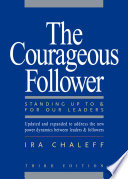

In 'The Courageous Follower', the author emphasizes that followers play a crucial role in any organization. They are not mere subordinates but active participants who can influence leaders and organizational outcomes. Followers are encouraged to take responsibility for their actions and decisions, understanding that they have the power to shape the direction of their teams and organizations. This idea challenges the traditional view of leadership as a top-down approach and highlights the importance of collaboration and mutual respect between leaders and followers.
Continue readingCourage is a central theme in the book. The author asserts that being a courageous follower means being willing to speak up, challenge the status quo, and support leaders while also holding them accountable. This involves taking risks, such as voicing dissenting opinions or providing constructive feedback, which can be uncomfortable but is necessary for growth and innovation. Courageous followers contribute to a healthy organizational culture where open dialogue and trust are fostered, ultimately leading to better decision-making and performance.
Continue readingThe book explores the dynamics of power within organizations. It argues that power is not solely vested in leaders; followers also wield influence and have the ability to affect change. The author encourages followers to recognize their own power and use it wisely to support leaders and advocate for their own needs and the needs of their teams. This balance of power is essential for creating a collaborative environment where all voices are heard and valued, leading to more effective leadership and followership.
Continue readingTrust is a foundational element of effective followership. The author discusses the importance of building trusting relationships between leaders and followers. Trust allows for open communication, vulnerability, and the willingness to take risks. Followers are encouraged to cultivate trust by being reliable, honest, and supportive. In turn, leaders must also demonstrate trustworthiness and transparency. This mutual trust fosters a positive organizational culture where individuals feel empowered to contribute and innovate.
Continue readingFeedback is a critical component of effective followership. The book emphasizes that followers should not only receive feedback from leaders but also provide it in return. Constructive feedback helps leaders improve their decision-making and enhances the overall effectiveness of the organization. The author provides strategies for giving and receiving feedback in a manner that is respectful and constructive, reinforcing the idea that feedback is a two-way street that benefits both leaders and followers.
Continue readingEthical dilemmas are an inevitable part of organizational life. The author discusses how courageous followers can navigate these challenges by staying true to their values and principles. This involves being willing to speak up against unethical behavior and advocating for what is right, even when it is uncomfortable. The book provides guidance on how to approach difficult conversations and make ethical decisions, emphasizing the importance of integrity in followership.
Continue readingThe final idea focuses on the development of personal leadership skills among followers. The author encourages readers to cultivate their own leadership qualities, regardless of their formal position within the organization. This includes self-awareness, emotional intelligence, and the ability to inspire and motivate others. By developing these skills, followers can enhance their contributions to the organization and prepare themselves for future leadership opportunities.
Continue readingThe reading time for The Courageous Follower depends on the reader's pace. However, this concise book summary covers the 7 key ideas from The Courageous Follower, allowing you to quickly understand the main concepts, insights, and practical applications in around 22 min.
The Courageous Follower is definitely worth reading. The book covers essential topics including The Role of Followers, Courage in Followership, The Balance of Power, providing practical insights and actionable advice. Whether you read the full book or our concise summary, The Courageous Follower delivers valuable knowledge that can help you improve your understanding and apply these concepts in your personal or professional life.
The Courageous Follower was written by Ira Chaleff.
If you enjoyed The Courageous Follower by Ira Chaleff and want to explore similar topics or deepen your understanding, we highly recommend these related book summaries:
These books cover related themes, complementary concepts, and will help you build upon the knowledge gained from The Courageous Follower. Each of these summaries provides concise insights that can further enhance your understanding and practical application of the ideas presented in The Courageous Follower.